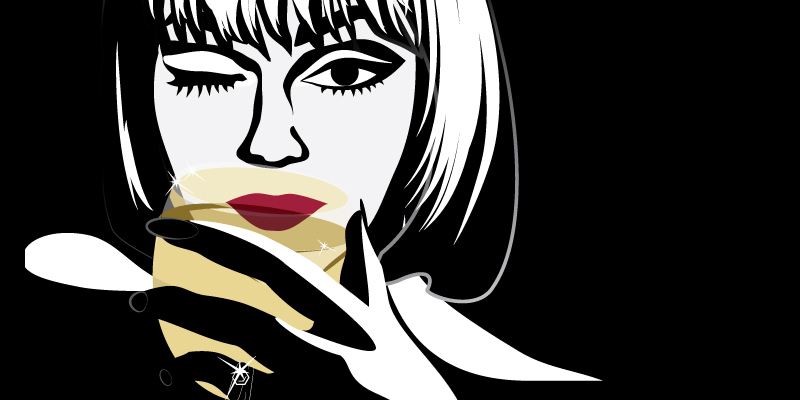It starts off innocently enough. After a long day at work, I find myself wanting to wind down. What could be more relaxing than a drink at the bar? Sitting down, I contemplate the menu and try to figure out what I’m in the mood for. But as my eyes glide over the list of specials and drinks on tap, I soon realize that the decision before me is far from relaxing; quite the opposite, in fact. Instead of casually choosing a drink, I am becoming increasingly hyperaware of what not to drink.
This is the Catch-22 of drinking while being Black. My drinks of choice tend to be on the sweet side. I typically prefer Moscato, a sweet, fizzy white wine, or sweet mixed drinks. But because I know about the cultural expectations of what a woman — and particularly a Black woman, a woman of color — is supposed to drink, a feeling of self-consciousness prevails when I order the drinks I want to consume.
That certain populations are unfairly stereotyped as drinking certain drinks is not news. Women are believed to like light wines and fruity mixed drinks. Craft beer is near synonymous with (white) hipster culture, while WASPS are stereotyped as being big drinkers. Religious groups like Muslims and Jews are also stereotyped, one for not drinking at all, (though someone like DJ Khaled is both a Muslim and a big drinker), and the other for their penchant for Manischewitz and Scotch.
Black women are thought to enjoy Moscato. Lil’ Kim first rapped about it back in 2005; now, Nikki Minaj has her own brand, and references to the drink have become a staple of hip-hop songs. And other drinks have become synonymous with other forms of Black culture. In addition to Moscato, mainstream images of hip-hop have also brought hard ales and beers like Colt 45 to the forefront, while a cognac like Hennessy has for generations been associated with Black drinking.
But these links between populations and cultures are not incidental, or value-neutral. These associations speak volumes about our cultural attitudes toward race and gender. They tell us a lot about the assumptions we make about how specific groups of people supposedly navigate through the world.
For women, for example, the cultural expectation that we should enjoy a sweet drink is tied to the belief that we should embrace femininity in all aspects of our lives. Sweet, mild-tasting drinks mirror our feminine image in the popular imagination. Hennessy is linked to the assumption that Black drinkers don’t know how to properly enjoy it, just like Moscato is believed to be a “gateway” drink for the unsophisticated. For Black drinkers who prefer Colt 45, the connotations are even more harmful: that they are low-class, low-brow, uncultured, loud hooligans. Other drinks like Cristal reinforced the association between Black drinking and the ugly thug stereotype. Cristal’s owner had no qualms about telling The Economist how little he appreciated the business of rappers, who he saw as hurting his brand. The comments caused Jay Z to boycott the brand and make his own drink.
Being openly marginalized, I’m almost hyperaware of the kind of implications that could come from me enjoying a certain drink. The nervousness around how others will perceive my drink choice, and whether my enjoyment of Moscato will perpetuate a dangerous stereotype, hang over what would otherwise be a positive experience of pleasure. I know that the problem is with them — the stereotypers. But I can’t help feeling self-conscious, just the same.
And that’s where the Catch-22 lies: On one hand, stereotypes are harmful. They are the first step toward dehumanization and violence. And yet, on the other hand, no one should have to deny themselves pleasure because others judge them for it.
Especially if you’re actually proud of your community.
It’s the one thing that I’ve realized over the years, sitting at bars and sipping Moscato, that shuts down my self-consciousness almost instantly. Because the thing is, I like these drinks. But I don’t just like their taste. I like their connotation. I like the communal association they give me. I find comfort in these drinks because they remind me of people like me, the people I grew up around. They connect me to my own community. And these connections are invaluable parts of my cultural identity.
While a bartender assuming I want a certain kind of drink based on the color of my skin can be upsetting, drinking a typically “Black” drink can be a way to show pride, a celebration of my community. Stereotyping can certainly cause harm — but that doesn’t mean a person of color shouldn’t drink whatever they damn well please when they’re out at the bar, taking pride in being associated with people like themselves, who might share their skin tone and their favorite drink.

